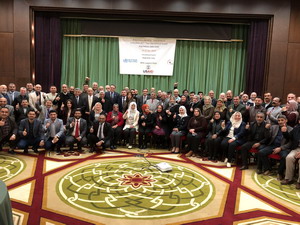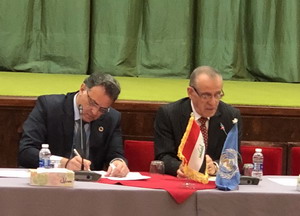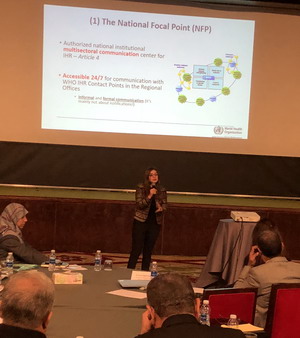 16 January 2019 – Under the patronage of H.E. the Minister of Health of Iraq Dr Alaa Alwan, a preparatory meeting for the joint external evaluation (JEE) was conducted on 14‒15 January 2019, in Baghdad.
16 January 2019 – Under the patronage of H.E. the Minister of Health of Iraq Dr Alaa Alwan, a preparatory meeting for the joint external evaluation (JEE) was conducted on 14‒15 January 2019, in Baghdad.
The meeting was organized jointly by the World Health Organization (WHO) and the Ministry of Health to train national stakeholders on the JEE tool and process. Seasoned experts from the WHO regional Health Emergencies Programme provided on-site support to the countrywide workforce to conduct the self-assessment process, an essential exercise to gauge the capacities and preparedness of Iraq’s health system to respond to public health emergencies.
 H.E. Minister of Health of Iraq Dr Alaa Alwan“Strengthening health security in Iraq by implementing the JEE self-assessment is our collective responsibility. We are committed to actively conduct this critical process to protect not only the people of our country but also people across our borders,” said Dr Alwan in his opening address. “Findings of the completed JEE will be shared with partners and donors to foster engagement and mobilize resources,” added Dr Alwan.
H.E. Minister of Health of Iraq Dr Alaa Alwan“Strengthening health security in Iraq by implementing the JEE self-assessment is our collective responsibility. We are committed to actively conduct this critical process to protect not only the people of our country but also people across our borders,” said Dr Alwan in his opening address. “Findings of the completed JEE will be shared with partners and donors to foster engagement and mobilize resources,” added Dr Alwan.
Dr Adham Ismail, acting WHO Representative in Iraq, pointed out that the JEE was not an audit but a voluntary request submitted by the Government, bringing together multidisciplinary and multisectoral national partners in a spirit of openness and transparency. “Once completed, the JEE recommendations will contribute to shaping Iraq’s health agenda to address public health threats and events. WHO will spare no effort in providing support to technical areas that require strengthening,” concluded Dr Ismail.
Over 100 participants from governmental sectors were actively engaged over the 2 days and reiterated the effectiveness of adopting a multisectoral ‘one health’ approach. They were mentored by WHO experts to critically assess the levels of the country’s core capacities in detecting and effectively responding to public health events and emergencies. They were also encouraged to identify and compile all reference documents that would eventually be required by the external team of experts during the JEE visit.
 Dr Dalia Samhouri, Programme Area Manager, Country Health Preparedness and International Health RegulationsDr Dalia Samhouri, Programme Area Manager, Country Health Preparedness and International Health Regulations, who facilitated the meeting, emphasized the critical importance of the active and candid participation of all concerned sectors. She said, “The valuable contribution of each one of you during this preparatory phase will unveil Iraq’s challenges and comparative advantages in case of any health emergency. Conducting the JEE represents a significant step in building International Health Regulations core capacities to prevent, detect and respond to all-hazard threats”.
Dr Dalia Samhouri, Programme Area Manager, Country Health Preparedness and International Health RegulationsDr Dalia Samhouri, Programme Area Manager, Country Health Preparedness and International Health Regulations, who facilitated the meeting, emphasized the critical importance of the active and candid participation of all concerned sectors. She said, “The valuable contribution of each one of you during this preparatory phase will unveil Iraq’s challenges and comparative advantages in case of any health emergency. Conducting the JEE represents a significant step in building International Health Regulations core capacities to prevent, detect and respond to all-hazard threats”.
Related links
Read more about the International Health Regulations (IHR 2005)








